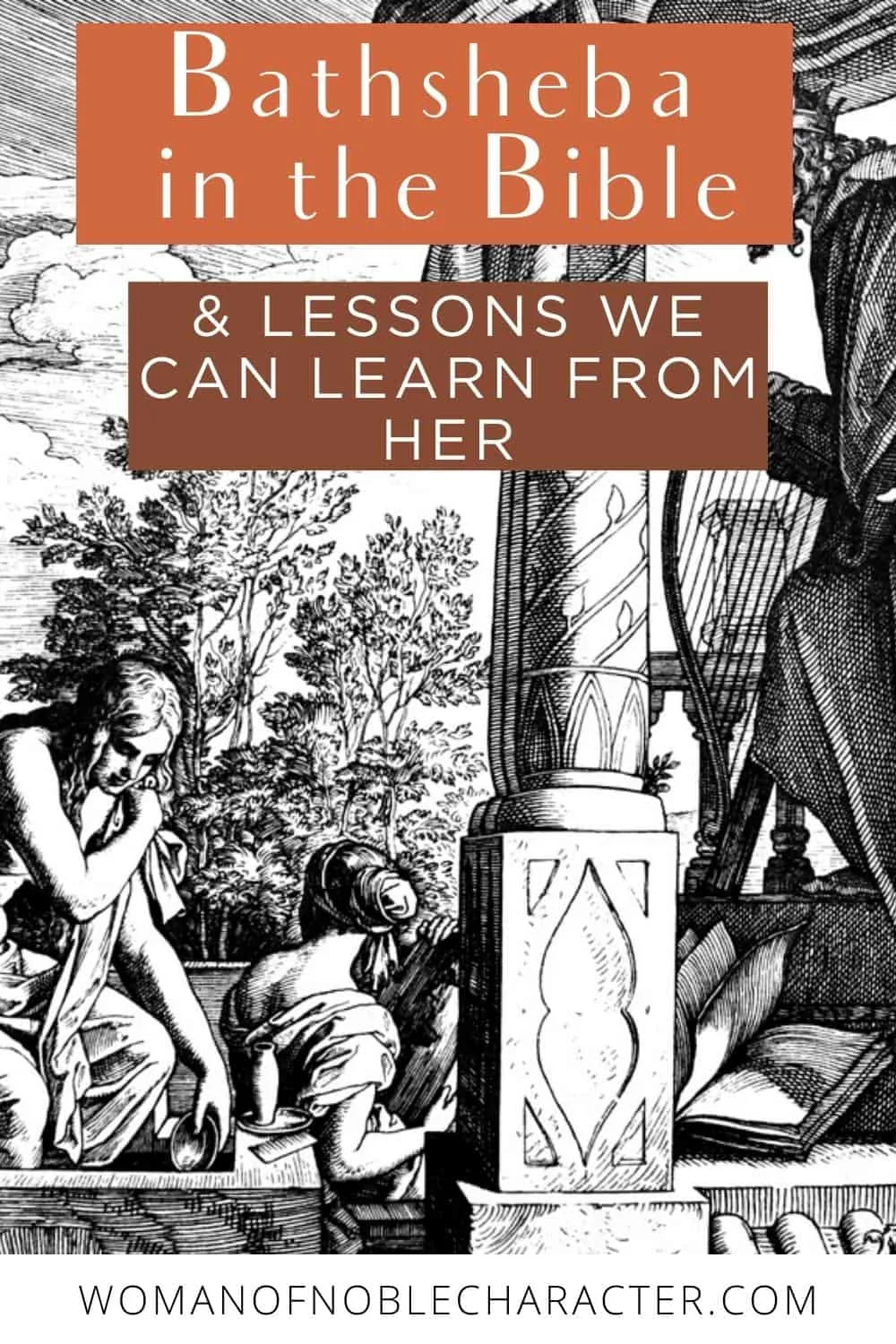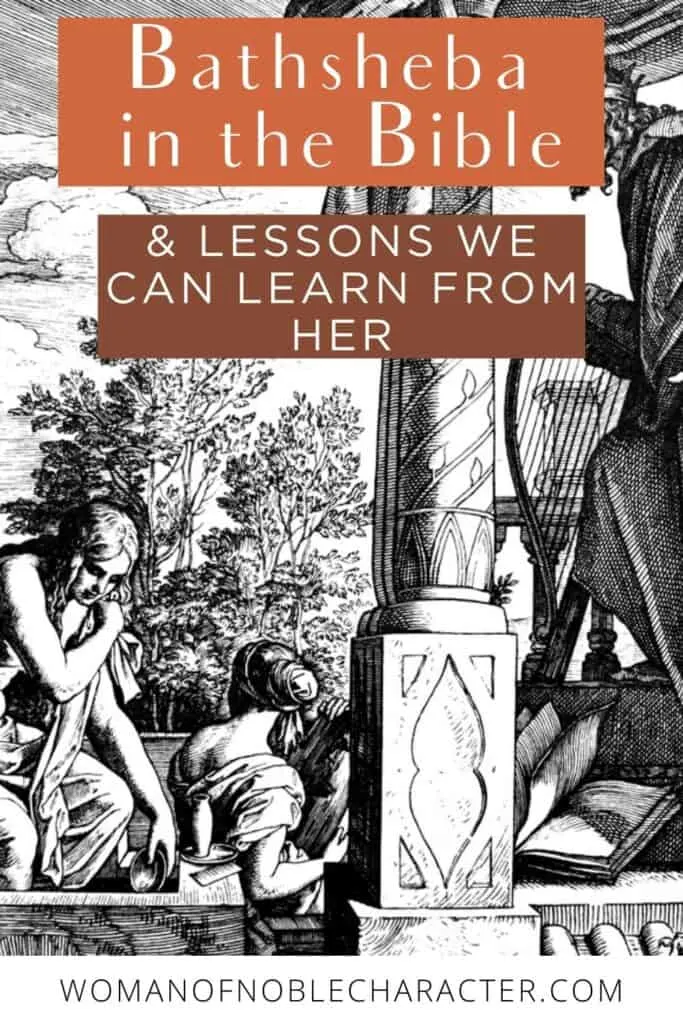This page/post may contain affiliate links. As an Amazon Associate, as well as an affiliate of other programs, this means if you purchase something using these links, I will receive a commission on qualifying purchases at no cost to you! For more detailed information, please visit our Affiliate Disclaimer page
The story of Bathsheba in the Bible and King David is full of drama, tragedy, and fateful consequences. From his palace rooftop overlooking the cityscape below, the king takes notice of beautiful Bathsheba as she bathes. This is followed by adultery that leads to bloodshed and guilt-ridden secrets. Of the lessons we can learn from Bathsheba in the Bible and King David is that even those in power are subject to their own human flaws while facing justice from an unrelenting higher authority.

Introducing Bathsheba: The Story of Bathsheba in the Bible
A beautiful sensual temptation scene sets the stage for one of the Bible’s most captivating stories: King David, gazing from his palace rooftop after a late afternoon rest, spots Bathsheba bathing in her courtyard during an Ammonite siege. His subsequent affair with her leads to Uriah -her husband- being summoned away and tragically killed as part of a plan orchestrated by David himself.
Uriah’s story is full of twists and turns. After summoning him from the front to cover a pregnancy, he refuses to go home, so King David has no choice but to have him slain in battle. For his sins not to go unanswered, God punishes the House of David with death – leading Uriah’s son conceived in adultery to die young too. However, Bathsheba ensures their second child; Solomon, becomes heir to the throne despite it all!
David’s behavior towards Uriah is a shocking condemnation of the abuse of power – taking away Uiriah’s beloved wife and claiming her for his own. We learn Bathsheba’s name when news reaches David that he could claim her, showing how far this powerful king will go to get what he wants.
“And David sent and inquired about the woman. And one said, “Is not this Bathsheba, the daughter of Eliam, the wife of Uriah the Hittite?’”
1 Samuel 12:3 (ESV)
Her family is a significant influence in the king’s court – her father and husband are important members of his elite vanguard, while her grandfather holds high authority as one of David’s wisest counselors (who later betrays David in allying with Absalom, chapters 15–16). But despite their powerful connections to royalty and having already taken on the role of wife, she was still singled out by David for an even more distinguished accolade – he wished to make her part of his pleasure.
So David sent messengers and took her, and she came to him, and he lay with her. (Now she had been purifying herself from her uncleanness.) Then she returned to her house. And the woman conceived, and she sent and told David, “I am pregnant.”
2 Samuel 11:4–5 (ESV)
Bathsheba in the Bible speaks just three words in this part of the story leaving us very little to go on to understand her feelings or her character. The parenthetical aside about her purifying herself may refer to the roof bath as a ritual cleansing at the end of her period, which would prepose David’s paternity.
After the passionate night Bathsheba and David had together, she cannot cleanse away their indiscretion. A few weeks later, her body will forever bear witness to what they did – an undeniable reminder that no matter how much ‘purification’ takes place afterward, it doesn’t erase the consequences.
Although many Bible readers disagree, some suggest that Bathsheba was no victim of the king. Instead, they claim she knew full well what would happen when she so brazenly bathed naked on her roof in plain view of David’s palace and made herself available to him. In this way, it has been suggested perhaps even hoped -that by becoming one of his wives, Bathseha might bear a future king!
He dragged her into his arms for one night – but she could pay with her life if it ever came to light. Placed in a difficult predicament due to the king’s complete dominion, an illicit relationship would mean certain death for this pregnant woman without protection.
The story’s narrative is primarily concerned with David’s moral downfall rather than Bathsheba being wronged – though she had no ability to refuse the King. The pregnancy becomes an unwitting anchor with which many readers can sympathize and perhaps even excuse her plight regardless of whether there was any force applied or not.
The Consequences of the Adultery
David had to come up with a devious plan to protect his paternity and free Bathsheba from suspicion of adultery. He summoned Uriah, who was serving at the front line, back home but instead, he refused honorably – loyal as ever, even when tempted by David himself. With no other option left open for him, David sent Uriah off again, along with a letter asking Joab set the soldier up in battle so that he could be slain.
When word reached them about what happened, poor Bathsheba grieved deeply over her lost husband. After waiting for an appropriate mourning period, David proposed marriage which eventually resulted in their baby boy being born out of this especially scandalous union. “But the thing that David had done displeased the Lord.”
Uriah said to David, “The ark and Israel and Judah dwell in booths, and my lord Joab and the servants of my lord are camping in the open field. Shall I then go to my house, to eat and to drink and to lie with my wife? As you live, and as your soul lives, I will not do this thing.”
2 Samuel 11:11 (ESV)
When the wife of Uriah heard that Uriah her husband was dead, she lamented over her husband.
2 Samuel 11:26 (ESV)
And when the mourning was over, David sent and brought her to his house, and she became his wife and bore him a son. But the thing that David had done displeased the Lord.
2 Samuel 11:27 (ESV)
Nathan the Prophet wasn’t always one for a gentle nudge – he took it straight to David, King of Israel. In an attempt to awaken his conscience, Nathan presented him with a powerful parable. Despite initially confessing and repenting for his wrongdoings, consequences had been set in stone – God’s judgment could not be avoided. To add insult to injury, another man would ultimately publicly possess David’s wives.
Thus says the Lord, ‘Behold, I will raise up evil against you out of your own house. And I will take your wives before your eyes and give them to your neighbor, and he shall lie with your wives in the sight of this sun. For you did it secretly, but I will do this thing before all Israel and before the sun.’”
2 Samuel 12:11–12 (ESV)
Disaster strikes the royal family one after another in rapid succession. It starts with their youngest son falling victim to a deadly illness, followed by Tamar being forced into incestuous rape at the hands of her half-brother Amnon. In an ironic twist of fate, Absalom – second in line for David’s throne – avenges his sister’s honor and kills Amnon before launching a revolt against his father, ultimately leading him to meet justice on the battlefield.
David’s heartfelt grief for his beloved son is expressed over several verses. Of course, Bathsheba, too, had to grieve the death of her child, though we don’t hear about it directly. In most parts of this story, she’s referred to only as – “wife of Uriah,” – which points toward a lack of control over events that broadly define who she was viewed as and how others treated her, such as a married woman with no agency at all.
With the devastating loss of their son, what must have gone through Bathsheba’s mind? The Bible doesn’t tell us if she knew it was because of David’s sin that God held him responsible for ending her child’s life. But we can only imagine how she felt in a moment so filled with grief and sorrow.
Nevertheless, because by this deed you have utterly scorned the Lord, the child who is born to you shall die.”
2 Samuel 12:14 (ESV)
Solomon, the Future King, is Born to Bathsheba in the Bible
After a heartbreaking loss, God blessed Bathsheba with Solomon. After nine months of mourning her son’s death, she welcomed this new blessing.
“Then David comforted his wife, Bathsheba, and went in to her and lay with her, and she bore a son, and he called his name Solomon. And the Lord loved him”
2 Samuel 12:24 (ESV)
David’s actions may not have seemed like an act of kindness at first, but he intended to show Bathsheba compassion in her darkest hour – he wanted her to feel the same empathy from him as she had just lost. According to the Hebrew language, ‘comforted’ means feeling pity and sorrow for someone’s misfortune or to avenge.
After experiencing grief, Bathsheba was blessed with what many today call a “rainbow baby” – and not just any child; God Himself loved this son. The prophet Nathan named him Jedidiah, which means ‘beloved by the LORD,’ signaling that it wasn’t merely man’s love for her newborn but also the Lord’s hand at work.
Bathsheba went to great lengths to ensure that her son Solomon would be king, naming him accordingly. She had a powerful alliance with Nathan, the prophet who gave this child of destiny an extra name: “Jedidiyah,” meaning beloved by God. Little did she know that her son would become heir and build the temple in Jerusalem!
Then David comforted his wife, Bathsheba, and went in to her and lay with her, and she bore a son, and he called his name Solomon. And the Lord loved him.
2 Samuel 12:24
Once a powerful king, David had fallen into the grips of old age. He was feeble and unaware that his son Adonijah had declared himself the rightful heir to the throne – but Bathsheba wasn’t about to let him be usurped! She took decisive action to make sure her son would become King in place of Adonijah. David also doesn’t “know” the beautiful young woman, Abishag, who lies with him to keep him warm.
Nathan and Bathsheba hatched a plan to ensure that Solomon, Bathsheba’s son, would become king. To bolster her plea for David’s aid in this endeavor, she even infused God into the oath – something not present earlier in scripture. Unmoved by Adonijah’s alliance against them and backed up by Nathan’s words of support, David officially declared his allegiance to making Solomon King by invoking the name of God himself.
Then Nathan said to Bathsheba the mother of Solomon, “Have you not heard that Adonijah the son of Haggith has become king and David our lord does not know it? Now therefore come, let me give you advice, that you may save your own life and the life of your son Solomon. Go in at once to King David, and say to him, ‘Did you not, my lord the king, swear to your servant, saying, “Solomon your son shall reign after me, and he shall sit on my throne”? Why then is Adonijah king?’ Then while you are still speaking with the king, I also will come in after you and confirm your words.”
1 Kings 1:11-14 (ESV)
She said to him, “My lord, you swore to your servant by the Lord your God, saying, ‘Solomon your son shall reign after me, and he shall sit on my throne.’
1 Kings 11:17 (ESV)
And now, my lord the king, the eyes of all Israel are on you, to tell them who shall sit on the throne of my lord the king after him.
1 Kings 11:20 (ESV)
In yet another invocation of an oath, Bathsheba plays a pivotal role in eliminating the rival brother, Adonijah son of Haggith. Again she plays the messenger to her son, the king, in requesting Abishag as wife on behalf of Adonijah.
Solomon’s wrath was quick and decisive when his brother rivaled for the throne. As a result, Solomon spoke an oath to have him executed – illuminating the meaning of Bathsheba’s name as ‘woman of oath’ (bat-shvu‘ah) in the process.

Some Interesting Notes on Bathsheba in the Bible
God chose to include Bathsheba in the remarkable and powerful lineage of Christ. She was not only the sole woman without a name listed among five women from his genealogy, but she also had an infamous backstory. Yet God saw fit to honor her by including her here.
“and Jesse the father of David the king.
Matthew 1:6 (ESV)
And David was the father of Solomon by the wife of Uriah,”
By divine design, Bathsheba’s son Jedidiah—better known as Solomon—may have been the mysterious King Lemuel responsible for authoring Proverbs 31. If this is true, it would make her none other than the inspiring woman of wisdom and virtue!
Even if Bathsheba was not the honored woman in Proverbs 31, her son, the king, honored and respected her, as detailed in 1 Kings 2:19.
So Bathsheba went to King Solomon to speak to him on behalf of Adonijah. And the king rose to meet her and bowed down to her. Then he sat on his throne and had a seat brought for the king’s mother, and she sat on his right.
1 Kings 2:19 (ESV)
Lessons From Bathsheba in the Bible
In the story of David and Bathsheba in the Bible, we find many lessons.
1) Sin, even “secret,” will be found out
2) God will forgive us if we repent
3) Even if we are forgiven, we may still experience sin’s consequences
4) God has a plan and can work even in difficult situations
Despite the tumultuous times, David and Bathsheba’s son Solomon still rose to power as the heir of their line. It just goes to show that even in difficult situations, God is always busy coordinating a divine plan according to His will.
5. Never lose hope
Many times, Christians can be perceived as having it all together. But if we take an honest look at Jesus’ lineage, even the most scandalous stories are part of His incredible story of hope! In this family tree, you’ll find Kings who have committed murder and adultery – yet in spite of these imperfections, God still chose to bring about a Savior for us through that line: Jesus Christ.
No matter how lost we may feel or what transgressions we’ve committed, Christians can find hope in the Lord. Jesus is our savior from all sins and a beacon of light through even the darkest stormy seas—His grace transforms us into something beautiful! We draw strength from stories like that of Bathsheba’s redemption, proving no mistake too big for His love to mend.
After reading about Bathsheba’s story, we hope you can apply some of the lessons to your life. What other lessons do you see in the story of Bathsheba in the Bible? Share them with us in the comments below!
You may also enjoy the video below and the recommended resources for further study.
Unspoken: The Biblical Story of Bathsheba (Lineage of Grace Series Book 4) Historical Christian Fiction Novella with an In-Depth Bible Study by Francine Rivers
Bathsheba: David’s Goliath by Curtis W Bigelow
ESV – “Scripture quotations are from The ESV® Bible (The Holy Bible, English Standard Version®), copyright © 2001 by Crossway, a publishing ministry of Good News Publishers. Used by permission. All rights reserved.”

